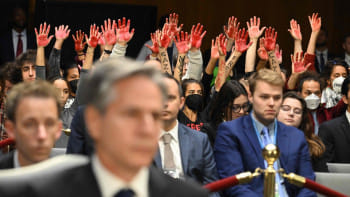Biden’s backing of Israel will come home to roost

US President Joe Biden's unwavering backing of Israel amid its ruthless war offensive on Gaza starkly contrasts with the founding principles of human rights he ostensibly upholds. The disparity between his advocacy for these rights and the horrific scenes in Gaza raises a moral conundrum that is likely to cast a long shadow over the 2024 presidential election.
Gaza's plight is distressing. Human rights activist Khalil Abu Shammala has called Gaza "the graveyard of human rights," succinctly capturing the dismal situation. Over 10,000 Palestinian casualties have been reported since October 7, the United Nations has noted, including a tragically high number of children. With more than 530,000 people taking shelter in UN facilities, the scale of the tragedy is massive. The infrastructure of Gaza lies in ruins, leaving civilians to scramble for safety among the debris of their previous lives.
This catastrophe has unfolded despite President Biden's advocacy for human rights, an advocacy that has been called into question by his administration's continuous military support to Israel. The Biden administration has faced sharp criticism for not halting arms sales or demanding an immediate ceasefire, fostering a growing disillusionment among voters.
The disillusionment is palpable in states like Michigan, where the Arab and Muslim American communities played a pivotal role in Biden's narrow victory. Their sentiment of betrayal could shift the political landscape. This feeling is echoed among young voters under 30, who, through social media, have become acutely aware of global injustices and the US' role in them. Polls suggest Biden's support is slipping among crucial demographics, notably Arab and Muslim Democrats.
Marione Ingram, an 87-year-old Holocaust survivor, stood outside the White House, pleading for a ceasefire. Her presence and her history lend a profound weight to her calls for peace and cast a sobering light on the consequences of inaction.
Within his own party, President Biden faces criticism. Congresswoman Rashida Tlaib's vocal stance for Palestinian rights led to her censure in a controversial move by her colleagues, indicative of the party's division. "The cries of Palestinian and Israeli children are indistinguishable to me," Tlaib said, challenging her colleagues' perspectives. This sentiment was shared by Steven Donziger, a lawyer belonging to the Jewish community, who decried the censure in a tweet: "Despicable that 4,000 children in Gaza have been killed by bombs funded by US taxpayers, and yet our elected officials squander time 'censuring' the sole Palestinian American in Congress for speaking the truth."
Organisations like Jewish Voice for Peace and Torah Jews have held demonstrations, chanting "let Gaza live," and have made clear their opposition to Zionism, distinguishing between their faith and political nationalism. "The Zionist state does not speak for all Jews," they assert, which complicates the monolithic view of the Jewish community and challenges Biden's pro-Israel stance.
Globally, the condemnation is widespread. Former Malaysian Prime Minister Dr Mahathir Mohamad tweeted that the Israelis kill their nameless, faceless victims with American-supplied bombs and missiles, voicing a sentiment echoed by many around the world disheartened by the US' involvement in the conflict.
The chilling statistics provided by the United Nations highlight a deepening humanitarian crisis. Al Jazeera's coverage has brought to light the perilous journey of Palestinians fleeing the violence. OCHA's reports indicate that nearly 1.5 million Gazans have become internally displaced. In central regions like Khan Yunis and Rafah, over half a million people have taken shelter near UNRWA facilities, struggling with scarce resources and sanitation.
The northern parts of Gaza and Gaza City are in an even more dire state post-evacuation orders, with around 160,000 internally displaced persons housed in UNRWA facilities. This only adds to the acute suffering of the civilians, with one casualty every 10 minutes—a grim figure that cannot be ignored.
The personal stories are harrowing. Emily Callahan, an American nurse with Doctors Without Borders, detailed to CNN's Anderson Cooper the desperation within the shelters: a shelter with only four toilets for 50,000 people, and medical staff enduring against all odds to save lives, knowing well the risks they face.
US Secretary of State Antony Blinken has publicly opposed the reoccupation of Gaza, yet the reality on the ground paints a different picture—civilians suffering, infrastructure destroyed, and countless lives lost. The gap between diplomatic speech and the lived reality of Gazans is vast and troubling.
The harrowing figures and testimonies from Gaza are not mere data; they signal a deep and escalating humanitarian crisis, demanding immediate and empathetic action. Just as Malcolm X's statement of the "chickens coming home to roost" encapsulated the inevitable return of negative consequences, the Biden administration's unwavering support for Israel might face a similar reckoning. Such policies, devoid of the human rights advocacy they profess, can lead to political and moral fallout, "roosting" in future electoral cycles and international relations.
In the intricate arena of international politics, the next moves by the Biden administration are critical. To maintain its status as a defender of human rights, a significant shift in policy towards the Israel-Gaza situation is imperative. This handling could indeed be a defining moment for Biden and the Democratic Party's future, as the phrase "coming home to roost" might ominously predict.
Will President Biden recalibrate his stance on Israel in time to reconcile his policy with his professed values, or will the shadows of Gaza's suffering darken his campaign trail for 2024? The moral integrity of America's foreign policy, the potential re-election of Biden, and the faith in the Democratic Party's principles are at stake. The choices made now will resonate beyond the current crisis, shaping Biden's legacy and influencing the global political landscape for years to come.
Mohammad A Auwal is professor of communication studies at California State University, US.
Views expressed in this article are the author's own.
Follow The Daily Star Opinion on Facebook for the latest opinions, commentaries and analyses by experts and professionals. To contribute your article or letter to The Daily Star Opinion, see our guidelines for submission.

 For all latest news, follow The Daily Star's Google News channel.
For all latest news, follow The Daily Star's Google News channel. 












Comments